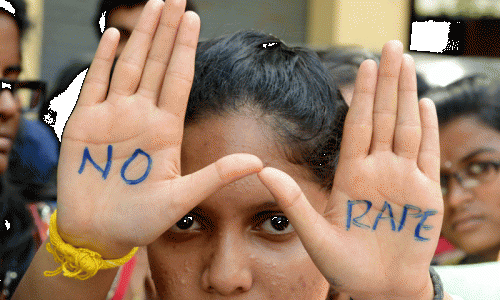LAHORE, Sept 13: The horrific case of a five-year old girl, who was gang-raped and then mercilessly left outside Ganga Ram Hospital, has left many shaken and disgusted.
The fact that there is a complete lack of a system of law and order in the country hits people each time such an incident occurs. To make matters worse, the public seems to dwell in its insensitivity and a state of denial, never raising any cries against the crimes.
“We may try to hide or justify all these incidents but the fact is that rape does exist and it will be better for us as a society if we recognise it and try to work from there,” says Irfan Mufti, deputy director of the South Asia Partnership, an NGO that tries to raise awareness about gender equality among other issues especially at the grass-root level.
“The problem in Pakistan is that we have no judicial system, we have no social system that can help avoid such crimes in future or help give penalty to the perpetrators for an incident,” he deplores.
Mufti also says a lack of awareness and care that parents have towards their children is appalling, where small children are left alone by their parents and are easily susceptible to crimes.
Diep Syeda, a social activist, views the situation as extremely unfortunate and compares it to the level of protest that took place in India after the infamous Delhi rape case.
“Not that any country in South Asia is any different but what happened at such a mass scale in Delhi shows that the civil society was still alive there. They came out despite circumstances, protested and put the government under real pressure,” she says. “Here, today the media acknowledges it but tomorrow all will be forgotten.”
She says it has more or less become fashionable only to discuss such issues but when it comes to taking to the street, people retreat in fear of embarrassment. Sumera Salim, Senior Capacity Building Officer of Aurat Foundation’s Gender Equity programme, proclaims that capital punishment would be a small penalty to pay for such offenders.
“We have discovered that for some reason these rape cases are more frequent in Punjab,” she says. “This is surprising because there is no lack of education as such but I do blame that poverty and unemployment may have a role to play.”
But Pakistan Criminologists chairman Dr Fateh Muhammad Burfat refutes this suggestion saying rapists and sexual abusers are essentially “sick in the head”.
“They cannot be termed normal by any standards even of the direct reasons of a rape incident lie in family feuds, or some other causes. In fact we have done a study where many times fake pirs have encouraged men to get physical with young girls (underage) so that they may overcome their sexual weaknesses. These men never rape their own family members so they are clever enough to select their victims, too.”
Dr Burfat says Pakistan was going through an intense period of social disorganisation where the social system had ‘collapsed’ and all the institutions such as family, religion, and even police, which kept people’s behaviour in check to a large extent, had more or less collapsed. The unfortunate part was that there has been no alternate social organisation which could replace this collapse. There was only a void.
“The media has crossed all ethical boundaries and has been airing the details about the girl without realising the shame and the hurt that her family can face as a result. The media should realise that it can talk about the criminals but not about the victims in such detail.
“As for India, the civil society there is organised because they have a more collective nationalistic spirit. We, on the other hand, have divided ourselves into communities and groups. We do not fight for the same cause, even if that cause is to stand up for a minor child.”














































